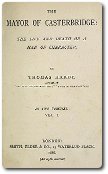Tess of the d'Urbervilles Contents
- Social / political context
- Religious / philosophical context
- Chapters 1-9
- Chapters 10-19
- Chapters 20-29
- Chapters 30-39
- Chapters 40-49
- Chapters 50-59
- Tess as a 'Pure Woman'
- Tess as a secular pilgrim
- Tess as a victim
- The world of women
- Tess as an outsider
- Coincidence, destiny and fate
- Disempowerment of the working class
- Heredity and inheritance
- Laws of nature vs. laws of society
- Modernity
- Nature as sympathetic or indifferent
- Patterns of the past
- Sexual predation
- Inner conflicts: body against soul
Coincidence, destiny and fate
Central motifs in Hardy's work
Readers are drawn to the concepts of coincidence, Fate and destiny in Hardy's novels because they seem central to the way in which he makes his plots work. However, Hardy was not a systematic philosopher, so it is not helpful to try to extract a coherent ‘worldview' from his use of these ideas.
Coincidence
Any novel has to use coincidence to some extent:
- To tie up the plot or sub-plots, and to resolve mysteries and secrets
- To bring characters together
- To create ironies and surprises.
Coincidences, of themselves, are neutral. It is how they affect the characters that matters. In fiction, any coincidence has to be made to work and to turn the plot in one direction or another.
Hardy's coincidences may appear to be happy at the outset, but ironically they often turn out badly.
The necessity of coincidences with a limited cast
Hardy has very few characters in Tess, dispersed over a period of five years and an area of some fifty miles by thirty miles. Realistically, the chances of three people meeting and re-meeting in such circumstances are very low, yet such a coincidence is never impossible. Given these parameters, it could be said that Hardy uses coincidence to the minimum in Tess. Only a few times do we find the coincidences a little far-fetched, for example the Darch girls turning up on the farm at Flintcombe-Ash. The one big coincidence is re-meeting Alec (Ch 44). But within the narrative arc, he is a past that has to be faced and resolved.
Destiny
 In The Mayor of Casterbridge, Hardy says that 'character is destiny'. George Eliot said a similar thing in Mill on the Floss, except she used the word 'fate'- as does Alec in Ch 8. He claims that it was 'my fate' to have a vicious horse; it is clearly in his character to possess such an animal.
In The Mayor of Casterbridge, Hardy says that 'character is destiny'. George Eliot said a similar thing in Mill on the Floss, except she used the word 'fate'- as does Alec in Ch 8. He claims that it was 'my fate' to have a vicious horse; it is clearly in his character to possess such an animal.
It could be said that it is Tess's characteristic lack of resolve which makes ‘coincidences' affect her so greatly, such as how easily she is discouraged from reaching Angel's parents and is turned back by the coincidence of overhearing his brothers and Mercy (Ch 44).
The same argument could be applied to when she pushes the letter to Angel under the carpet. Could it be that, at some subconscious level, she did not want Angel to get the letter? She perhaps wanted it 'brushed under the carpet' (see Other images and symbols).
An ironic novelist such as Hardy exploits such alternative explanations but refuses to guide his readers. Thus, a tension between writer and reader is set up.
Fate
'Fate' has a more impersonal connotation than 'destiny', and is usually perceived as a more hostile force. That is why, as the coincidences stack up against Tess, the reader perhaps feels there is some malevolent force against her. Hardy emphasises this idea with his comment on Tess's execution, that:
Hardy uses various prefiguring devices, such as omens, to prepare us for such patterns of malevolence working through apparent coincidences (though this denies that there is a role for chance and coincidence!). At times, the character of Time itself seems to act as fate. Hardy writes:
See also: Plot and time structures; Determinism and free will.